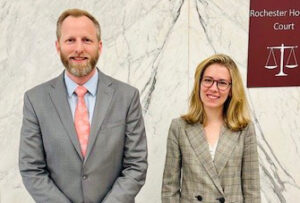This website uses cookies
We use cookies to ensure that we give you the best experience on our website. If you continue to use this site we will assume that you are happy with it.
In the spring of 2020, as the COVID shutdown intensified pressures on local tenants, Cornell Law launched a hotline for those who lacked access to legal resources. That fall, hotline clients began to receive pro bono support and representation from the newly formed Tenants Advocacy Practicum. Five years, some 2,100 clients, and over $286,000 in recovered, awarded, and distributed funds later, the Tenants Advocacy Program is more vital than ever.
Established by Michaela Azemi, former director of public interest and community engagement, the practicum was launched by Professor William Niebel, who initially split his time between the program and his work at Legal Services of Central New York before joining the Law School full-time in 2022, thanks to a grant subcontracted by Legal Assistance of Western New York.

Professor William Niebel and Kathryn Krause Wozer, tenants advocacy staff attorney and adjunct professor of law
Over the past five years, additional grants have also enabled Tenants Advocacy Program to add a fellowship, a staff attorney, and a program coordinator. Now a growing complement of seasoned full-time attorneys, law students, recent law graduates, and undergraduate volunteers work together year-round to provide free legal assistance and representation to residential tenants across upstate New York, helping them to recover security deposits, obtain repairs, avoid eviction, and more.
“In the midst of a severe housing crisis, our student-attorneys in the practicum are leveling the playing field for tenants,” says Kathryn Krause Wozer, tenants advocacy staff attorney and adjunct professor of law. “It’s incredible to see the soft skills and confidence that they gain by the end of their first semester, as well as the broader impact on our clients’ lives and the community.”
Opportunities for hands-on experience continue to expand. Each of the past two summers, the Tenants Advocacy Program welcomed seven J.D. students as full-time interns for its program participating in the Monroe County Tenant Defense Project. This year, they represented thirty-two tenants facing eviction in Rochester City Housing Court and secured numerous favorable settlements, saving clients a combined $37,645 in rental arrears.
Summer intern and current practicum student Beril Karakoyun ’27, says: “I remember telling myself, ‘Wow, I’m actually acting like a lawyer right now and negotiating with an actual lawyer!’ It turns out that using civil procedure is much more fun than learning about it, especially when the rules provided good strategies for the tenants I represented.”
“It’s amazing how big of a difference legal representation can make, even on the most basic matters,” adds fellow intern and practicum student Led Klosky ’27. “For example, New York law states every tenant facing eviction has the right to ask for an adjournment at their first appearance and simply knowing of and exercising that right can be of significant value to tenants, who often see every day of preparation for the case as critical.”
Summer 2025 also saw an expansion of the Tenants Advocacy Program’s online services, with the beta launch of “Teny 2.0,” an AI tenants’ rights chatbot developed in collaboration with legal automation startup Josef. Building on the original Teny chatbot launched in 2022, this platform now provides tenants with quick, comprehensive housing law information, under close attorney moderation.
The momentum continues this fall, with sixteen practicum students advising and representing seventy-one tenants; to support this growing caseload, the Tenants Advocacy Program is recruiting law student volunteers, spring externs, and pro bono scholars to join the team. Having received unprecedented levels of interest from undergraduate students, the program is also onboarding a record-breaking cohort of twenty volunteers to assist with hotline intake, court monitoring, data analysis, tech, and communications.
“The Tenants Advocacy Program continues to grow both because of the tremendous need for pro bono tenant advocacy and also because getting to directly relieve some of the injustices faced by tenants is such a profoundly empowering experience for students,” says Niebel. “This is an opportunity to apply what they’ve learned in law school in a way that unquestionably improves people’s lives.”